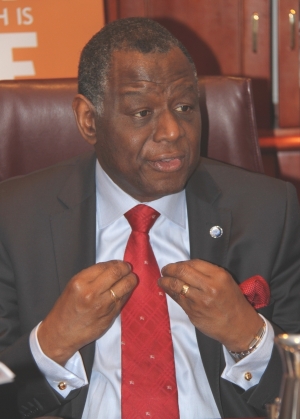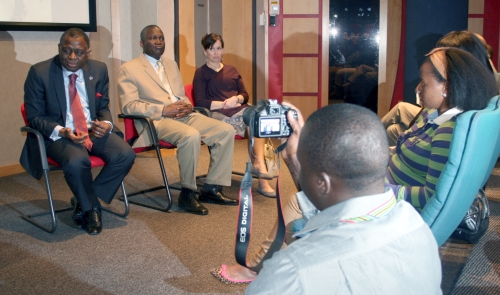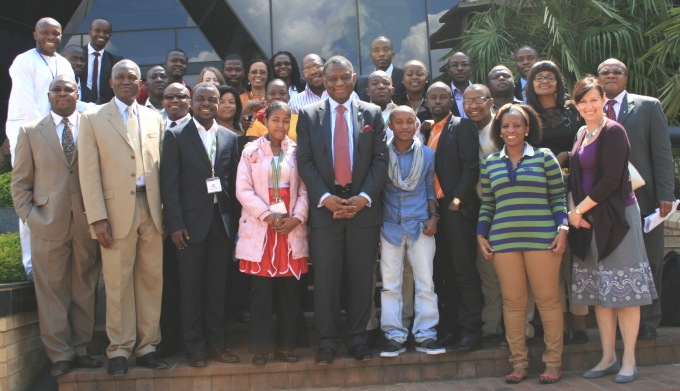On a whirlwind tour of South Africa last week, UNFPA Executive Director Dr. Babatunde Osotimehin left an indelible impression on politicians, partners, media, young people and staff members from the Regional, Sub-Regional and Country offices alike.
Dr. Osotimehin visited the country to attend the 60th anniversary of the International Planned Parenthood Federation (IPPF) at the Pan-African Parliament in Johannesburg. In his welcome address, he endorsed further partnership with IPPF at the global level.
Before the event he met the South African Minister of Health, Dr. Aaron Motsoaledi, with whom he’d had discussions at the London Family Planning Summit in July this year on the country’s commitment to the family planning agenda. They discussed increasing collaboration to ensure that South Africa benefits.
He also met the President of the Pan-African Parliament, the Honourable Bethel N. Amadi, at his offices before moderating a panel debate at the IPPF event on the role that sexual and reproductive health and rights should play in the future global development framework.
Dr. Osotimehin visited the LoveLife Headquarters in Johannesburg, as well as the Wits Reproductive Health and HIV Institute in the Health Precinct, where he discussed the country’s response to HIV and its work with key affected populations.
At the UNFPA Africa Regional Office he attended a meeting with a group of Members of Parliament from European Union member states, and held an informal meeting with about 25 young people from all over Africa on issues affecting them as young Africans. They were in the country to attend UNFPA’s Young People & Social Media Meeting in Johannesburg that week.

At a media briefing in Johannesburg on World AIDS Day, 1 December, the Executive Director said there has been good progress in the fight against HIV and AIDS, including in Africa. “We have seen a reduction in new infections and there are now a large number of people on treatment. Given the determination we have, we can actually eliminate HIV.”
However, a number of challenges exist: “We need to ensure greater ownership of programmes at the country level. Treatment for HIV has become a chronic thing and governments must understand that they must provide it on an ongoing basis.” Treatment needs to be inclusive, especially when it comes to young people. New infections among young people need to be reduced, he said.
The Executive Director said the International Conference on Population and Development (ICPD) in Cairo in 1994 was a groundbreaking moment. UNFPA’s mandate derives from the ICPD Programme of Action, which is people centred and rights based in that it enables people as individuals to make choices, get educated and achieve their potential. “As an organization, since 1994 we have been supporting the rights-based movement that allows women to achieve their potential. When you allow girls to stay in school, to mature and to get an education, they reach a physical, psychological and emotional maturity that enables them to make choices in their lives, to achieve their potential and contribute to their communities’ economic growth,” he said. Yet Africa still faces a number of challenges. For example, in many countries the population is growing faster than the economy. “This is why we are working actively in those countries,” he said.
If all women had access to family planning, maternal mortality would decline by one third. “UNFPA is working on the ground in many African countries to reduce maternal mortality. We initiated the Campaign for Accelerated Reduction of Maternal Mortality in Africa (CARMMA) together with the African Union (AU) because we have the technical wherewithal to speed up progress towards reducing maternal mortality on the ground.”
Fast-tracking the response to humanitarian crises
In response to a question from the media, Dr. Osotimehin said that when it came to humanitarian crises, UNFPA has a fast-tracking procedure in place for deploying resources very quickly. UNFPA has a vital role to play in humanitarian crises, he said. “What matters is that the dignity of women must not be compromised in these situations, including their access to sanitaryware. In crises, women who are pregnant still need care. UNFPA is the agency that deals with these issues.”
There is no context where society should accept maternal deaths
On the question of culture versus family planning, Dr. Osotimehin said: “There is no culture or context that I know of where society should accept that women should die giving life. What we are trying to do is save the lives of women and their children and make sure they can stay healthy. We have seen an uptake of family planning in these situations. In Nigeria, we have created Schools of Husbands, where we have explained to men the issues we are dealing with, and that we should not allow women to die needlessly because of a lack of undertanding of these issues.”
Women want fewer children than they’ve had

When asked about his response to the view prevailing among many people that children are a gift of God and should not be prevented, Dr. Osotimehin said the use of family planning was not a matter of reaching for a demographic target. “In every situation where we’ve asked women the question about how many children they want, almost invariably they respond that they wanted to have fewer than they’ve had. Family planning is about giving them the choice to have the number of children they can afford to look after. We would be there to help them make sure they can space their children in order to be healthy, and so their children can be healthy.
“While working in Nigeria, women would come up to me to say, ‘We want family planning because we want to have the children we want,’ but they didn’t want their husbands to know. That’s why the majority of the uptake in Africa is injectable contraceptives.” This means women’s use of family planning often goes undetected by their husbands.
In response to a question on some religions not supporting family planning and the need to educate people on family planning, Dr. Osotimehin said UNFPA is engaged in discussions in communities to explain what family planning entails and to empower people to make choices, which is their right. “We all have women in our lives – our sisters, wives, mothers and aunts. We’d like girls to go to school, be able to find jobs, and decide about children. Family planning is about giving life, about spacing births and the right of women to do that effectively. There is little justification for stopping women from exercizing their rights over their bodies.”
Taking CARMMA to the next level
The high-level presidential sesion on CARMMA at the AU Summit on 27 January 2013, being organized jointly by UNFPA and the AU, will take CARMMA to the next level, he said. To date, 37 countries have launched CARMMA and “it now needs to be operationalized on the ground so we can save more lives. We can make a difference and we look forward to working with heads of states on this,” he said. “CARMMA is such an important initiative, and it is central to the mandate of UNFPA. This special event has been organized to mobilize states to do far more on the ground. This is what we are working towards.”




